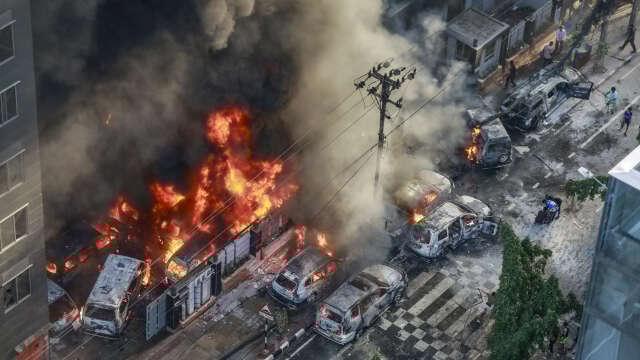
Student protesters in Bangladesh on Friday stormed Narsingdi prison, freeing 800 prisoners, and staged rallies in the capital Dhaka despite a police ban on gatherings and a widespread internet shutdown.
Since the beginning of July, a massive movement, launched by students, has called for the repeal of a law promoting access to the public service to the relatives of the veterans of the 1971 independence war.
This law is, in fact, perceived as unfair to the unemployed graduates in a country where the average age is just over 27 years old and where young people lack the future prospect (according to data from the Statistics Office Bangladesh (BBS) in March, 39.88 percent of young people aged 15 to 24 do not work, are not in training or do not study).
These massive demonstrations (sometimes bringing together several hundred thousand people) were welcomed with brutal state repression, as police have used real bullets and at least 105 and possibly as many as 133 people have been killed in the protests.
The government has also deployed the army and called on paramilitary units such as border guards and the rapid action battalion, known for their history of human rights violations. The government has cut the country’s internet, closed schools and universities and arrested several opposition leaders.
These measures did not dissuade the movement which assumed the escalation by burning official buildings and a television channel, attacked police stations and stormed the Narsingdi prison, leading to the escape of 800 prisoners. In addition, at least two police officers died in the clashes.
This Friday, the government imposed a strict curfew with an order to “shoot on sight” throughout Bangladesh to try to end the movement. Without success, until present, since thousands of people still demonstrated yesterday in Rampura (Saturday July 20) against the curfew.
The uprising has emerged as a momentous challenge to Prime Minister Sheikh Hasina’s autocratic government after 15 years in office.
Student protesters stormed a jail in the central Bangladeshi district of Narsingdi and freed the inmates before setting the facility on fire.
“Our protest will continue,” said Sarwar Tushar, who joined a march in the capital and sustained minor injuries when it was violently dispersed by police.
“We want the immediate resignation of Sheikh Hasina. The government is responsible for the killings.”
At least 52 people were killed in the capital on Friday, according to a list drawn up by the Dhaka Medical College Hospital.
Police fire was the cause of more than half of the deaths reported so far this week, based on descriptions given by hospital staff.
Protesters had on Thursday torched, vandalised and carried out “destructive activities” on numerous police and government offices.
Among them was the Dhaka headquarters of state broadcaster Bangladesh Television, which remains offline after hundreds of incensed students stormed the premises and set fire to a building.
Nearly half of Bangladesh’s 64 districts reported clashes on Thursday.
More than 700 people had been wounded throughout Thursday including 104 police officers and 30 journalists.
